Monkeying Around
A dozen rock critics banged on their computers for a dozen years for this totally random simian song sampler
Fri., Aug. 5, 2005
"Little Monkey"
Devendra Banhart, Oh Me Oh My ... (2002)
What, exactly, is inscrutable folk hero Banhart getting at in this slight paean to a tiny monkey that swings past him? One possible parsing of the lyrics suggests Banhart's comparing a flighty princess to the swift, acrobatic spider monkey. Like her arboreal doppelganger, she lives in a fig tree – her "Jewish canteen" in the Catskills – leading her tribe to the promised land. Preferring retreat to combat, Banhart's monkey is gone before she even says hello. – Melanie Haupt
"Monkey Begun"
Lou Barlow, Emoh (2005)
No one does existential crisis better than Lou Barlow. "Am I monkey; am I man? I feel I've just begun," he sings sweetly, a man facing his own evolution within a relationship that's come undone. Barlow balances the primitive urges of our less-sophisticated cousins against the confusion of his own higher nature. Does he want to groom her for nits or dazzle her with philosophy? In the end, he gives up the analysis and decides to just run with it. – Melanie Haupt
"Brass Monkey"
Beastie Boys, Licensed to Ill (1986)
Brass monkey: rum, vodka, and OJ. A drink as obnoxious as the squawking saxophone that made this ode to getting wasted a loutish Eighties heir to "Yakety Yak" by the Coasters. "Put your left leg down, your right leg up, tilt your head back, let's finish the cup," instruct the Boys, pledging fealty to this foul concoction over Moët, Chivas, and martinis. They especially enjoyed mixing it with Spanish Fly and were so convincing they've dedicated their career to half-apologizing for the boozy Brooklyn braggadocio.
– Christopher Gray
"Everybody's Got Something to Hide Except for Me and My Monkey"
The Beatles, The White Album (1968)
Who would've thought anyone within the Beatles entourage – aside from Ringo – would be labeled a monkey by British tabloids? And yet such vile treatment was always saved for Yoko, the supposed wrench grinding the entire operation to a halt. Wishing to duck the mounting hatred and paranoia that surrounded him, John overdubbed enough orgiastic voices and guitars to create the perfect distraction for him and his bride to briskly skip off into the sunset. Ramsey Lewis' scorching instrumental cover captures the windburns. – Robert Gabriel
"Monkey"
Cornelius, Fantasma import (1998)
Electro sorcerer Cornelius (né Keigo Oyamada) is the perfect example of Japanese pop culture. Throughout Fantasma, he references aliens, samples The Price Is Right, and mashes together enough bizarre snippets of sound – hip-hop, polka, drone, birds – to throw a monkey wrench into pop music. "Monkey" is a cute pastiche of cartoon sounds, kazoos, and sugar-high tweakage thrown into a mellow My Bloody Valentine wash. Ape shall not kill ape; ape shall remix ape. – Audra Schroeder
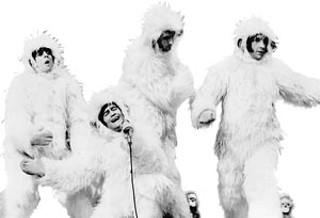
The Monkees
Despite their origin as a prefabricated Beatles, the Monkees now represent an evolutionary cultural bridge that transported scores of well-scrubbed American children from Captain Kangaroo to the feel-good liberation of the Seventies. As good as their records were, the group's subversion was largely confined to the TV show, on which the Monkees emulated their primate cousins with onscreen antics. While many viewers dismissed The Monkees as harmless buffoonery, the show existed beyond the obligations of family and workplace. Work only got done in the context of play. Whatever job or girlfriend a Monkee got during an episode would be over by credits' roll. Zany energy was their raison d'être, particularly for Micky Dolenz, who must've had an urn of coffee all to himself at the craft-services table. It was the perfect advertisement for ducking adult responsibility for as long as possible. The show developed a social conscience in its second season, and the Monkees' 1968 movie, Head, used war footage to comment on Vietnam, but the public didn't buy it. Caged in by their own irreverence, the group wouldn't savor the banana of widespread critical acclaim until years later. – Greg Beets"Guerillas in tha Mist"
Da Lench Mob, Guerillas in tha Mist (1992)
Ice Cube protégés J-Dee and T Bone assumed the Yoruban role, lyrically speaking, of Signifying Monkey by turning racial stereotypes on their eardrums. What one person calls a playful, inadequately intelligent shit-slinger, another calls a calculated, chest-thumping revolutionary. "With the boom ping ping," Da Lench Mob turn the tables on America's own hypocritical system of apartheid. Flipping samples of "California My Way" by the Main Ingredient and "The Payback" by James Brown, the message is clear: "Beware of the black fist." – Robert Gabriel
"You Drive Me Ape (You Big Gorilla)"
The Dickies, The Incredible Shrinking Dickies (1979)
This two-minute barrage of punk rock shenanigans is as sublimely stupid as a plantain Pop-Tart and just as impossible to ignore. Over Stan Lee's treetop guitars and Chuck Wagon's sing-song keyboard swings King Dickie Leonard Graves Phillips' joyous ode to jungle love. "The city is a jungle, now this is it. Every time I look at you I go ape shit." – Marc Savlov
"The Monkey's Uncle"
Annette Funicello, The Monkey's Uncle (1965)
This Disney fluff was one of Annette Funicello's last roles as a teen star. Good thing, since the British Invasion was steamrolling her squeaky-clean teen comedies. Nevertheless, this is a catchy and irresistibly fun theme, the Beach Boys backing her up in the film and the harmonies. Neither had much to do with the titular monkey, but it does address a mum issue: "I wish I was the monkey's aunt!" – Margaret Moser
"Shock the Monkey"
Peter Gabriel, Security (1982)
Those poor research monkeys, lathered with toxic shampoos, forced to chain-smoke cigarettes, launched into outer space, found themselves an advocate in ex-Genesis frontman Peter Gabriel. "Something knocked me out the trees. Now I'm on my knees." As the song's rhythmic pendulum swings toward the grim reality of an industrial nightmare, screaming souls of mischief plot an ambitious escape back to jungle freedom. In retching unison, "Darling, don't you monkey with the monkey." – Robert Gabriel
"The Apes of Wrath"
GWAR, Violence Has Arrived (2001)
"The Apes of Wrath" is pretty much what you'd expect from the codpieced George Romero rejects: toilet-water speed metal piled atop lyrics like, "I am the ruler, mutilator of dreams." GWAR's bio states the band actually evolved from apes. Of course "The Apes of Wrath" didn't sound much different from tracks like "Biledriver" or "Abyss of Woe," but just try to stop yourself from hurling your own feces at a wall. – Audra Schroeder
"King Kong"
Daniel Johnston, Yip/Jump Music (1983)
Johnston's a cappella "King Kong" zooms in on two of the most recurrent themes in his songwriting: being held captive by civilization and downfall by feminine beauty. Sung in a high-pitched warble into a tape recorder, Johnston sees beyond the special effects terror of the giant ape's destruction to the underlying tragedy of an impossible love that left him "all choked up inside." Tom Waits' boozy beat-box cover on last year's Johnston tribute, The Late Great Daniel Johnston: Discovered Covered, is a lullaby for the damned. – Greg Beets
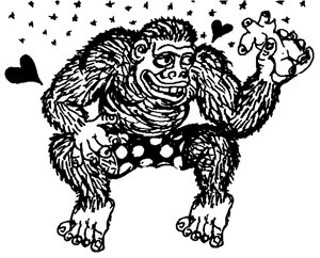
"Like A Monkey in a Zoo"
Daniel Johnston, Songs of Pain (1980)
Although this metaphor for the tedium of being caged and on display could apply to any captive creature, Johnston's monkey is intelligent enough to bear the weight of its situation, which adds to the song's sad poignancy. Even worse, he's fully aware of his own complicity, forever lamenting the decision to trade freedom for a concrete floor and all the peanuts he can eat. "You say I'm cute," Johnston sings, perhaps to some sympathetic female cooing outside the cage, "You don't know how much that hurts." – Greg Beets
"Apeman"
The Kinks, Lola Versus Powerman and the Moneygoround (1970)
"Lola" ain't the only bait to trap a 10-year-old in Ray Davies' playscape. Try "Apeman," as childproof as the Beatles' "Octopus's Garden." The tropical tympani, banjo, burbling bass, and grand piano set the scene for the swinging chorus ("I'm an ape man, I'm an ape ape man"), but it's the adult to which Davies' genius sticks. "I don't feel safe in this world no more. I don't want to die in a nuclear war. I wanna sail away to a distant shore. And make like an ape man." – Raoul Hernandez
"The Monkey Time"
Major Lance, Okeh single (1963)
As dance crazes go, the Monkey hit big time in 1963. You had the Monkey Glide, the Monkey Bird, the Monkey Stroll, the Monkey Shine, the Monkey Walk, and the Monkey Mash. But that summer you couldn't find a smoother slab of wax than this pièce de résistance to classy, uptown Chicago soul. The sweet, seductive voice of former boxer Major Lance, backed by the Impressions and some brassy orchestration, monkeyed this Curtis Mayfield gem to the top of the charts. They just don't make 'em like this anymore. – Jay Trachtenberg
"Monkey"
George Michael, Faith (1987)
"Why can't you set your monkey free? Always giving in to it. Do you love the monkey or do you love me?" On the surface, George Michael's hit single from his masterwork Faith could be misunderstood as a love song dedicated to a zookeeper. Instead, this energetic pop tune yearns for the targeted lover to shake their substance abuse, articulated concisely with Michael's lyric, "Don't look now, there's a monkey on your back." – Matt Dentler
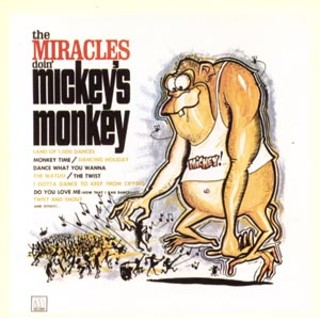
"Mickey's Monkey"
The Miracles, Motown single (1963)
"All right, is everybody ready?" exhorts the youthful voice of William "Smokey" Robinson, still too early in a career for his name to appear above that of his group, the Miracles. Hopping aboard drummer Benny Benjamin's Bo Diddley beat, Robinson & Co. launch into what proved one of Motown's most unabashedly joyful, if underappreciated, dance hits. They tore up The T.A.M.I. Show with a smokin' rendition. Lum-dee lum-dee lie! – Jay Trachtenberg
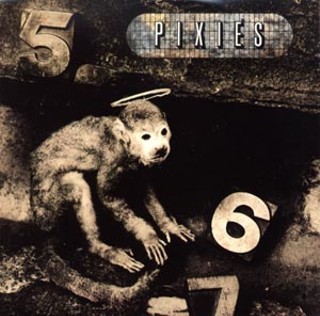
"Monkey Gone to Heaven"
Pixies, Doolittle (1990)
King Kong himself, Mr. Black Francis, led his generation-influencing cronies through a river of sludge via New York and New Jersey with this Generation X classic predicting, essentially, the end of the world. Polluted oceans, empty skies, burning cities: the Pixies do Nostradamus. Numerology aside, did the monkey go to heaven only because God is seven? There's no better way to get throngs counting than to blast that first heavy measure. – Darcie Stevens
"Space Monkey"
John Prine, Live on Tour (1997)
A previously unrecorded cut on Prine's second live album, "Space Monkey" was co-written with Peter Case. The story of a Russian primate that returns to Earth after 40 years circling the big blue orb to find the Cold War and the Space Race over is filled with Prine's wit and whimsy. It concludes with the monkey drinking American vodka in a karaoke bar off Red Square with the dog that flew Sputnik and a blind, red-headed, one-legged parrot that worked in the research department of Dow Chemical. – Jim Caligiuri
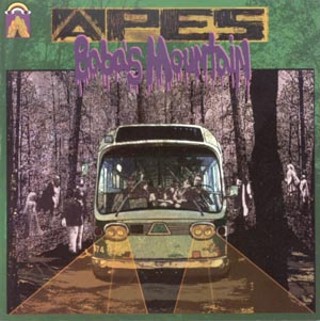
The Apes
A few months ago, a man was severely mauled by two chimpanzees at an animal sanctuary while he and his wife were visiting another chimp that was removed from their Los Angeles home years before. They were bringing the estranged chimp a birthday cake when two chimps in an adjacent cage escaped and attacked him, chewing off most of his face and ripping off his testicles and a foot. The chimpanzee can be a very jealous creature, especially when it comes to buttercream frosting. The Apes, however, are a different story. This Brooklyn by way of D.C. quartet won't rip your balls off in a frenzied show of territorial aggression, but don't let that be a deal breaker. Their most recent Birdman disc, Baba's Mountain, pounds out a guitarless mist of sweaty organs, primal bass, and singer Paul Weil's chest-beating Jim Morrison impression. These Apes speak in a language of barely controlled howls, grunts, and cosmic shout, shout, let it all out. The Apes are already halfway down the valley and into the urban sprawl, with an eight-minute drum solo, to boot! – Audra Schroeder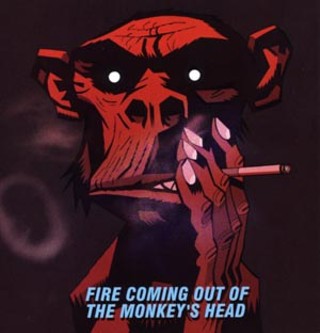
Gorillaz
It's official, macaque-suckers: Damon Albarn's simian simulacra are now, according to The Guinness Book of World Records, the Most Successful Virtual Band ever. Their eponymous 1999 debut may have struck the fickle capuchins of the Brit music press as a puckishly googly-eyed gag, but Albarn's alignment with Tank Girl creator Jamie Hewlett – no stranger to provocateurian poo-flinging himself – remains a stroke of jackanapes genius and a cast-down banana peel gauntlet on the floor of the post-Britpop dance floors. Backed in the real world first by Dan the Automator and most recently by Danger Mouse, the band – drummer and ex-Los Angeleno Russell, 10-year-old Japanese guitarist-girl Noodle, dentifrice-impaired frontman 2-D, and ominous bass-whacker Murdoc – has managed to undermine/overhaul both UK pop and Dennis Hopper's career (see "Fire Coming Out of the Monkey's Head") with the sort of grim, end-of-days verve previously reserved for their flesh-and-blood counterparts. Their meta-credo, "Reject False Icons," is as clear a broadside on the state of millennial rock & roll as a boil on a baboon's blue bottom. Don't be a monkey's uncle and grind your own organ for a change. – Marc Savlov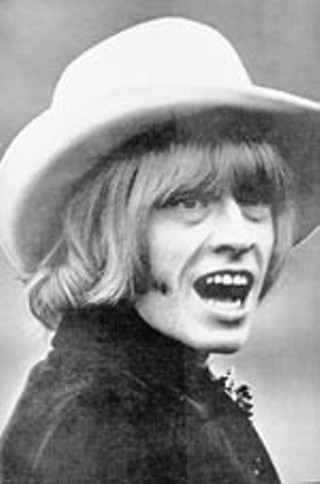
"Monkey Man"
Rolling Stones, Let It Bleed (1969)
The signature keyboard plinkety-plink and Mick Jagger's whoop in the introduction says it all. Or is it the opening line that makes it rock? "I'm a flea-bit peanut monkey, all my friends are junkies." Who is the monkey? By legend, the monkey is the trickster. So is it Mick or Keith behind the simian mask? Maybe Charlie Watts or Bill Wyman? Peel away the mask. It's Brian Jones. (But that's not really true.) – Margaret "Monkey Woman Too" Moser
"Monkey Business"
Skid Row, Slave to the Grind (1991)
Heard of howler monkeys? That's Sebastianumbnuts bachrum in Latin. Written by the Jersey quintet's Dave "the Snake" Sabo and Rachel Bolan (no relation to T. Rex), the just-say-no-way to junk ode ("Ain't no business if I got monkeys on my back") opens the hair band's sophomore LP with Bach's eye-clawing screech. His T-shirt, "AIDS Kills Fags Dead," would prove prophetic to his own career until Broadway needed another diva, and the Gilmore Girls needed a guy. – Raoul Hernandez
"Monkey Man"
Toots & the Maytals, Beverly's single (1969)
A cheatin' song, plain and simple. He's heard you've been "huggin' up that big monkey man," a furry-knuckled, gorilla-type no doubt. What distinguishes this from the multitude of other such tunes is its irresistible beat. Coming in the wake of Toots' ground-breaking "Do the Reggay," which gave the new style a name, "Monkey Man" became Toots' first international hit and spawned countless covers. – Jay Trachtenberg
"King Kong"
Frank Zappa, Uncle Meat (1969)
Like the fictitious ape, Zappa's "King Kong" became a monster. Initially an instrumental suite that concludes Uncle Meat, a soundtrack to an unfinished film, it morphed into one of his most enduring pieces of music. Performed on stage until 1988, Zappa used the theme as a jumping off place for a half-hour jam that introduced the band, part of "audience participation time." – Jim Caligiuri
"Monkey Wash Donkey Rinse"
Warren Zevon, Mutineer (1995)
As a religious icon, the monkey represents the devil and a whole slew of vices. What better way to celebrate this notorious rep than to describe getting ready for a "debutante's ball" in hell? Written before his grim cancer diagnosis, "Monkey Wash Donkey Rinse" is a triumph of Zevon's macabre wit as he surveys an apocalyptic party scene he knows we're all invited to in the end. – Melanie Haupt
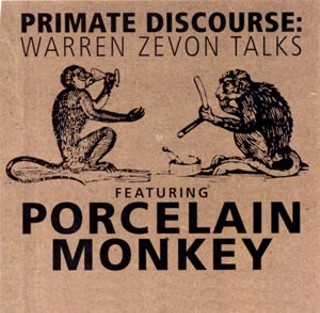
"Porcelain Monkey"
Warren Zevon, Life'll Kill Ya (2000)
With its references to gold lamé, Las Vegas, hip-shakin', rockabilly, and "his face on velveteen," Zevon's obviously singing about Elvis in "Porcelain Monkey." The monkey reference is a lot more obscure. The song was inspired by a postcard possessed by Jorge Calderone, the song's co-writer, of Graceland's TV room: In the center of the garish black-and-yellow room is a white monkey figurine with onyx eyes mischievously perched on a table. – Jim Caligiuri








